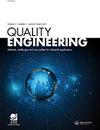约束随机化下加速寿命试验的贝叶斯分析
IF 2.2
4区 工程技术
Q4 ENGINEERING, INDUSTRIAL
引用次数: 0
摘要
可靠性工程师通常优先考虑较低的百分位数。准确地评估这些较低的百分位数使工程师能够更深入地研究早期产品故障,为提高产品可靠性铺平道路。在制造领域,由于时间和预算的限制,许多加速寿命试验(ALTs)都偏离了完全随机设计(crd)。在ALTs中,应力的改变会导致产品失效机制的转变。为了准确地辨别产品寿命的百分位数,必须考虑到这些不同的失效机制和随机效应。我们的方法引入了一个封装随机效应和不同失效机制的重新参数化模型。在这个模型中,我们使用一个特定的百分位数来代替尺度参数,为建立一个将百分位数、加速度应力和随机效应联系起来的回归模型奠定基础。同时,设计了形状参数与加速度应力关系的单独回归模型。利用贝叶斯方法,我们确定模型参数的估计值。将该模型应用于以玻璃电容器为重点的ALT实例。模拟强调了该模型在提供较低寿命百分位数的更精确估计方面的能力。此外,贝叶斯方法进一步提高了寿命百分位数估计的准确性。关键词:加速寿命试验参数化模型随机效应非恒定形状参数布尔分布附加信息经费资助国家自然科学基金项目[no . 72002066, 71871204, 71902138];教育部人文社会科学青年基金项目[19YJC630181]。作者简介吕珊珊王国栋,郑州航空航天大学管理工程系副教授。他获得南昌航空大学应用数学学士学位,北京航空航天大学可靠性工程硕士学位,天津大学质量工程博士学位。主要研究方向为试验设计和可靠性改进。吕立山,河北工业大学经济管理学院讲师。2012年获郑州大学学士学位,2018年获天津大学硕士和博士学位。主要研究方向为实验设计、可靠性分析与改进、多响应优化。王国栋,李凡,2020年毕业于河北科技大学,获经济学学士学位。她目前在天津河北工业大学经济与管理学院攻读硕士学位。她感兴趣的领域是质量工程和质量管理。李立森,2020年毕业于郑州航空航天大学工业工程专业,获学士学位。他目前是天津河北工业大学经济与管理学院硕士研究生。他的研究领域包括可靠性工程、质量控制和管理。本文章由计算机程序翻译,如有差异,请以英文原文为准。
Bayesian analysis of accelerated life test under constrained randomization
AbstractReliability engineers typically prioritize the lower percentiles. Accurately assessing these lower percentiles enables engineers to delve deeper into early product failures, paving the way for enhanced product reliability. In the manufacturing realm, many accelerated life tests (ALTs) veer away from completely randomized designs (CRDs) due to constraints in time and budget. Within ALTs, alterations in stress can lead to shifts in the failure mechanism of products. To accurately discern product lifetime percentiles, there is an imperative need to account for these varying failure mechanisms and random effects. Our approach introduces a re-parameterization model encapsulating random effects and disparate failure mechanisms. In this model, a specific percentile is employed as a stand-in for the scale parameter, laying the groundwork for a regression model interlinking the percentile, acceleration stress, and random effect. Concurrently, a separate regression model is designed for shape parameters in relation to acceleration stresses. Leveraging the Bayesian method, we ascertain the estimated values for the model parameters. The model is applied to an ALT example focusing on glass capacitors. The simulations underline the model’s prowess in delivering a more precise estimation of lower lifetime percentiles. Additionally, the Bayesian method further refines the accuracy of the lifetime percentile estimations.Keywords: Accelerated life testre-parameterization modelrandom effectsnonconstant shape parametersWeibull distribution Additional informationFundingThis work was supported by the National Natural Science Foundation of China under Grants [numbers 72002066, 71871204, and 71902138]; the Humanity and Social Science Youth Foundation of Ministry of Education of China under Grant [number 19YJC630181].Notes on contributorsShanshan LvGuodong Wang is an associate professor in the Department of management engineering at Zhengzhou University of Aeronautics, Zhengzhou, China. He received his BS Applied Mathematics from Nanchang University of Aeronautics, Nanchang, China, an MS degree in Reliability Engineering from Beihang University, Beijing, China, and a PhD in Quality Engineering from Tianjin University, Tianjin, China. His research interests focus on design of experiments and reliability improvement.Fan LiShanshan Lv is a lecturer in the School of Economics and Management at Hebei University of Technology. She received her B.S. degree from Zhengzhou University in 2012, M.S. and Ph.D. degree from Tianjin University, Tianjin, China, 2018, respectively. Her research interests include design of experiments, reliability analysis and improvement, and multi-response optimization.Guodong WangFan Li received the B.S. degree in economics from Hebei University of Science and Technology in 2020. She is currently a master degree candidate in the School of Economics and Management at the Hebei University of Technology, Tianjin. Her fields of interest are quality engineering and quality management.Sen LiSen Li received the B.S. degree in Industrial Engineering from the Zhengzhou University of Aeronautics, Zhengzhou, in 2020. He is currently a master degree candidate in the School of Economics and Management at the Hebei University of Technology, Tianjin. His fields of interest are reliability engineering, quality control and management.
求助全文
通过发布文献求助,成功后即可免费获取论文全文。
去求助
来源期刊

Quality Engineering
ENGINEERING, INDUSTRIAL-STATISTICS & PROBABILITY
CiteScore
3.90
自引率
10.00%
发文量
52
审稿时长
>12 weeks
期刊介绍:
Quality Engineering aims to promote a rich exchange among the quality engineering community by publishing papers that describe new engineering methods ready for immediate industrial application or examples of techniques uniquely employed.
You are invited to submit manuscripts and application experiences that explore:
Experimental engineering design and analysis
Measurement system analysis in engineering
Engineering process modelling
Product and process optimization in engineering
Quality control and process monitoring in engineering
Engineering regression
Reliability in engineering
Response surface methodology in engineering
Robust engineering parameter design
Six Sigma method enhancement in engineering
Statistical engineering
Engineering test and evaluation techniques.
 求助内容:
求助内容: 应助结果提醒方式:
应助结果提醒方式:


